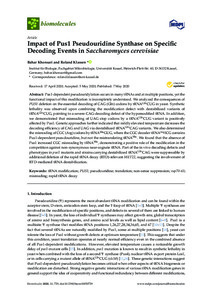Impact of Pus1 Pseudouridine Synthase on Specific Decoding Events in Saccharomyces cerevisiae
| dc.date.accessioned | 2020-06-29T15:32:58Z | |
| dc.date.available | 2020-06-29T15:32:58Z | |
| dc.date.issued | 2020-05-07 | |
| dc.identifier | doi:10.17170/kobra-202006291376 | |
| dc.identifier.uri | http://hdl.handle.net/123456789/11611 | |
| dc.description.sponsorship | Gefördert durch den Publikationsfonds der Universität Kassel | ger |
| dc.language.iso | eng | eng |
| dc.rights | Namensnennung 4.0 International | * |
| dc.rights.uri | http://creativecommons.org/licenses/by/4.0/ | * |
| dc.subject | tRNA modification | eng |
| dc.subject | PUS1 | eng |
| dc.subject | pseudouridine | eng |
| dc.subject | translation | eng |
| dc.subject | non-sense suppression | eng |
| dc.subject | sup70-65 | eng |
| dc.subject | misreading | eng |
| dc.subject | rapid tRNA decay | eng |
| dc.subject.ddc | 570 | |
| dc.title | Impact of Pus1 Pseudouridine Synthase on Specific Decoding Events in Saccharomyces cerevisiae | eng |
| dc.type | Aufsatz | |
| dcterms.abstract | Pus1-dependent pseudouridylation occurs in many tRNAs and at multiple positions, yet the functional impact of this modification is incompletely understood. We analyzed the consequences of PUS1 deletion on the essential decoding of CAG (Gln) codons by tRNAGlnCUG in yeast. Synthetic lethality was observed upon combining the modification defect with destabilized variants of tRNAGlnCUG, pointing to a severe CAG-decoding defect of the hypomodified tRNA. In addition, we demonstrated that misreading of UAG stop codons by a tRNAGlnCUG variant is positively affected by Pus1. Genetic approaches further indicated that mildly elevated temperature decreases the decoding efficiency of CAG and UAG via destabilized tRNAGlnCAG variants. We also determined the misreading of CGC (Arg) codons by tRNAHisGUG, where the CGC decoder tRNAArgICG contains Pus1-dependent pseudouridine, but not the mistranslating tRNAHis. We found that the absence of Pus1 increased CGC misreading by tRNAHis, demonstrating a positive role of the modification in the competition against non-synonymous near-cognate tRNA. Part of the in vivo decoding defects and phenotypes in pus1 mutants and strains carrying destabilized tRNAGlnCAG were suppressible by additional deletion of the rapid tRNA decay (RTD)-relevant MET22, suggesting the involvement of RTD-mediated tRNA destabilization. | eng |
| dcterms.accessRights | open access | |
| dcterms.creator | Khonsari, Bahar | |
| dcterms.creator | Klassen, Roland | |
| dc.relation.doi | doi:10.3390/biom10050729 | |
| dc.subject.swd | Transfer-RNS | ger |
| dc.subject.swd | Pseudouridin | ger |
| dc.type.version | publishedVersion | |
| dcterms.source.identifier | EISSN 2218-273X | |
| dcterms.source.issue | Issue 5 | |
| dcterms.source.journal | Biomolecules | eng |
| dcterms.source.pageinfo | 729 | |
| dcterms.source.volume | Volume 10 | |
| kup.iskup | false |
Dateien zu dieser Ressource
Das Dokument erscheint in:
-
Artikel [1238]


